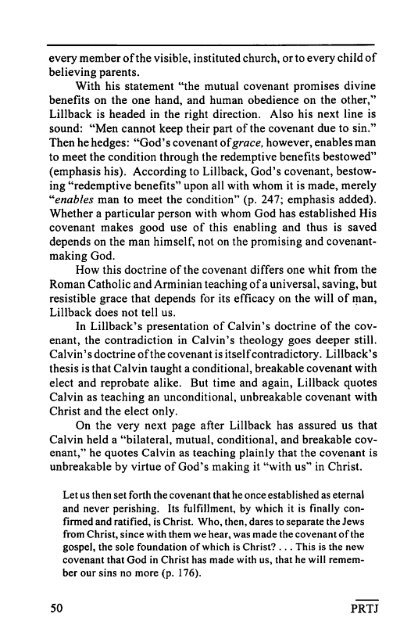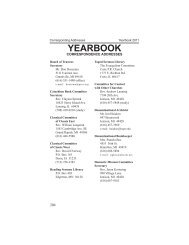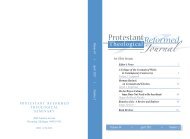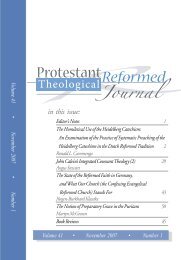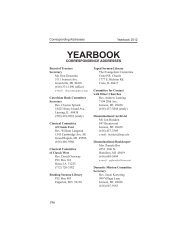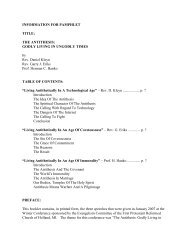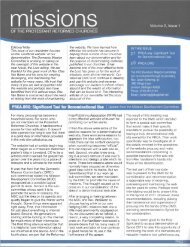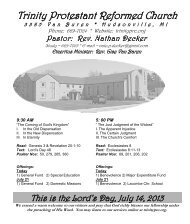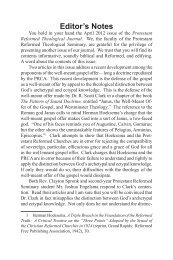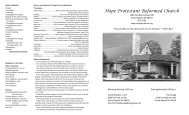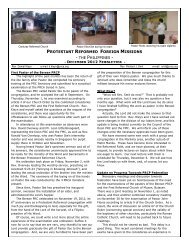pdf - Protestant Reformed Churches in America
pdf - Protestant Reformed Churches in America
pdf - Protestant Reformed Churches in America
You also want an ePaper? Increase the reach of your titles
YUMPU automatically turns print PDFs into web optimized ePapers that Google loves.
every member ofthe visible, <strong>in</strong>stituted church, orto every child ofbeliev<strong>in</strong>g parents.With his statement "the mutual covenant promises div<strong>in</strong>ebenefits on the one hand, and human obedience on the other,"Lillback is headed <strong>in</strong> the right direction. Also his next l<strong>in</strong>e issound: "Men cannot keep their part of the covenant due to s<strong>in</strong>."Then he hedges: "God's covenant ofgrace, however, enables manto meet the condition through the redemptive benefits bestowed"(emphasis his). Accord<strong>in</strong>g to Lillback, God's covenant, bestow<strong>in</strong>g"redemptive benefits" upon all with whom it is made, merely"enables man to meet the condition" (p. 247; emphasis added).Whether a particular person with whom God has established Hiscovenant makes good use of this enabl<strong>in</strong>g and thus is saveddepends on the man himself, not on the promis<strong>in</strong>g and covenantmak<strong>in</strong>gGod.How this doctr<strong>in</strong>e of the covenant differs one whit from theRoman Catholic and Arm<strong>in</strong>ian teach<strong>in</strong>g ofa universal, sav<strong>in</strong>g, butresistible grace that depends for its efficacy on the will of ~an,Lillback does not tell us.In Lillback's presentation of Calv<strong>in</strong>'s doctr<strong>in</strong>e of the covenant,the contradiction <strong>in</strong> Calv<strong>in</strong>'s theology goes deeper still.Calv<strong>in</strong>'s doctr<strong>in</strong>e ofthe covenant is itselfcontradictory. Lillback'sthesis is that Calv<strong>in</strong> taught a conditional, breakable covenant withelect and reprobate alike. But time and aga<strong>in</strong>, Lillback quotesCalv<strong>in</strong> as teach<strong>in</strong>g an unconditional, unbreakable covenant withChrist and the elect only.On the very next page after Lillback has assured us thatCalv<strong>in</strong> held a "bilateral, mutual, conditional, and breakable covenant,"he quotes Calv<strong>in</strong> as teach<strong>in</strong>g pla<strong>in</strong>ly that the covenant isunbreakable by virtue ofGod's mak<strong>in</strong>g it "with us" <strong>in</strong> Christ.Let us then set forth the covenant that he once established as eternaland never perish<strong>in</strong>g. Its fulfillment, by which it is f<strong>in</strong>ally confirmedand ratified, is Christ. Who, then, dares to separate the Jewsfrom Christ, s<strong>in</strong>ce with them we hear, was made the covenantofthegospel, the sole foundation ofwhich is Christ? ... This is the newcovenant that God <strong>in</strong> Christ has made with us, that he will rememberour s<strong>in</strong>s no more (p. 176).50PRTJ


